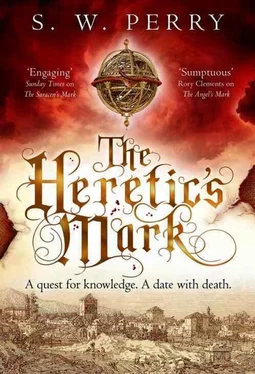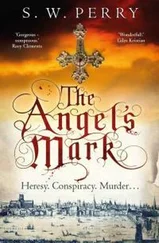And where, now, is the fellow to whom this bill should be presented? In the pay of Sir Robert Cecil, that is where. Physician to Lord Burghley’s ill-formed younger son. Favoured by the queen herself, if what Vaesy has heard is true – though how Her Grace can bear to listen to the man’s wild, heretical ideas he cannot imagine. These undeserved endowments are, in Vaesy’s mind, the interest on the debt the wretch owes.
With detached professional interest, Vaesy observes the executioner take up his knife and geld the struggling old man on the scaffold. He nods at the practised ease with which the wrinkled white belly is opened up, spilling the hot pearlescent billows onto the planks. He watches the blood spill over the edge of the platform. For a moment he sees himself climbing the steps and instructing the crowd on the inner workings of the human body.
The axe begins to swing, quartering the Jew’s still-breathing body with a sound like someone dropping four heavy sacks of flour in quick succession. Then one final blow finishes the grisly masque for good. The executioner holds up the head by its now-crimson beard.
And in that moment the man watching from the crowd forgets the crush of sweating bodies that press upon him with such rude familiarity. The stink of unwashed common broadcloth and half-eaten coney pies, of cheap ale and rotten gums, fades entirely from his nostrils. In its place, as if carried sweetly on a sympathetic summer breeze, Sir Fulke Vaesy thinks he can smell the faint but distinct scent of revenge.
PART 1

Falling from Heaven
St Thomas’s Hospital, Southwark.
Thirteen days later, 20th June 1594
‘Tell us, Dr Shelby: when did you first conspire with the executed traitor Lopez to poison Her Grace the queen?’
The questioner wears the livery of Robert Devereux, the young Earl of Essex. He is a large man. He has to stoop slightly in this dank low-ceilinged former monk’s cell. His face reminds Nicholas Shelby of an oval of badly cast glass on a grey day, cold and impenetrable. Judging by the foot-long poniard he wears at his belt, the noble earl has not hired him to wait at his table or tend his privet hedges. His companion is also armed. He stands close to his master, as though he hopes a little of the other man’s menace might rub off on him.
Even in summer the hospital warden’s office has the dank stink of the river about it, the walls cold and slippery to the touch, a place more suited to burial than the administration of healing. Now, in the shocked silence that follows the man’s accusation, it has for Nicholas the stillness of a freshly opened crypt. Before he can reply, the warden gives a frightened little harrumph. His eyes, set unnaturally close to the bridge of his thin nose, hurriedly fall to the ledgers on his desk. He seems to think that the harder he studies the inky scrawls, the further he can remove himself from the implications of what he’s just heard. ‘I have no knowledge of Mr Shelby,’ he mutters to the pages, ‘other than of his duties at this hospital. Beyond that, I am not of his acquaintance.’
Nicholas thinks: that’s exactly the kind of betrayal I might have expected from a man I have always imagined more as a pensioned-off Bankside rat-catcher than a hospital warden, a man who sneeringly refuses to understand why a physician who now serves Sir Robert Cecil, the queen’s privy councillor and secretary, should still care enough about healing to visit St Thomas’s Hospital for the sick poor of Bankside on a Tuesday and Thursday, without even asking for the shilling a session you grudgingly paid me when I was down on my luck.
He keeps his reply calm and measured. Bravado will be as incriminating as hesitancy. ‘Who are you to speak with such impertinence to a loyal and obedient subject of Her Majesty?’
The man gives a smile that is very nearly a sneer. ‘Judging by what Master Warden has just said, it would appear you must account for yourself without an advocate, Master Shelby. Please answer the question I put to you.’
‘It is not a question,’ says Nicholas. ‘It has no merit. It is an insult. And as a member of the College of Physicians, to you I am Mister Shelby.’
A contemplative nod, while the man considers if this has any bearing on the matter at hand. Then he looks at Nicholas with eyes as sharp as the poniard he carries at his belt. ‘Then as a physician, Mister Shelby, you must know what hot iron can do to a man’s fingers. How will you practise your physic with burnt stumps?’
‘This is risible. I will hear no more of it.’
Nicholas moves towards the door, intending to leave. A thick, leather-sleeved arm blocks his way. Not suddenly, but smoothly – as if the body it is attached to has seen all this before and knows precisely how this measure is danced.
‘Did you not see the recent revels at Tyburn, Mr Shelby?’ asks the younger of Essex’s men, a hollow-cheeked fellow with lank pale hair that hangs down each side of his face like torn linen snagged on a thicket. He mimics the lolling head of a hanged man, while one fist makes an upwards-slicing motion over his own ample belly. He dances a few steps in feigned discomfort, as though he’s stepping over his own entrails.
As ever when Nicholas is raised to a temper, which is not often, the Suffolk burr in his voice becomes more evident. ‘No, I did not! Let me pass. I have borne quite enough of this nonsense.’
‘That is a pity, Dr Shelby,’ says the owner of the arm. ‘It might have proved an instructive lesson – for your likely future.’
Nicholas bites back the reply that has already formed in his mind: What you call a revel was nothing but the murder of an innocent old man. In these present times, to express sympathy for a condemned traitor is almost as dangerous as committing the alleged treachery yourself.
‘You would be advised to give a proper account of yourself to Master Winter here,’ says the mimic with the lank hair, nodding towards his friend. ‘When did the executed traitor Lopez seek to enrol you in his vile conspiracy?’
‘Do you really expect me to answer that?’
The warden seems to deflate into an even smaller huddle over his ledgers. He shakes his head as if trying to cast off a bad memory, or perhaps to show Essex’s men that he never wanted Nicholas Shelby anywhere near St Tom’s in the first place, however far he may have risen since.
The one named Winter says, ‘Oh, be assured, sir, you will answer the denouncement – before me, or before the Queen’s Bench: the choice is yours.’
Denouncement. So that’s it, Nicholas thinks. Someone has made a false accusation against me. He tries to think who it might be. He has few enemies, and none made willingly. Perhaps some minor member of the aristocracy has taken offence that the new physician to Sir Robert Cecil refuses to purge him for an overindulgence of goose and sirloin.
‘Who has laid this false charge against me?’ he demands to know.
Winter’s reply is non-committal. ‘I am a servant of His Grace the earl, not a market-stall gossip.’
‘And I am in the service of Sir Robert Cecil,’ Nicholas reminds him. ‘I am physician to his son. Now let me go about my lawful business.’
Winter puts one thick hand on the hilt of his poniard and lifts just enough blade from the sheath to show he means business.
‘I am sure Sir Robert can find another doctor to attend his son, should the present one lose his life resisting arrest for treason. You are to come with us to Essex House.’
Читать дальше













